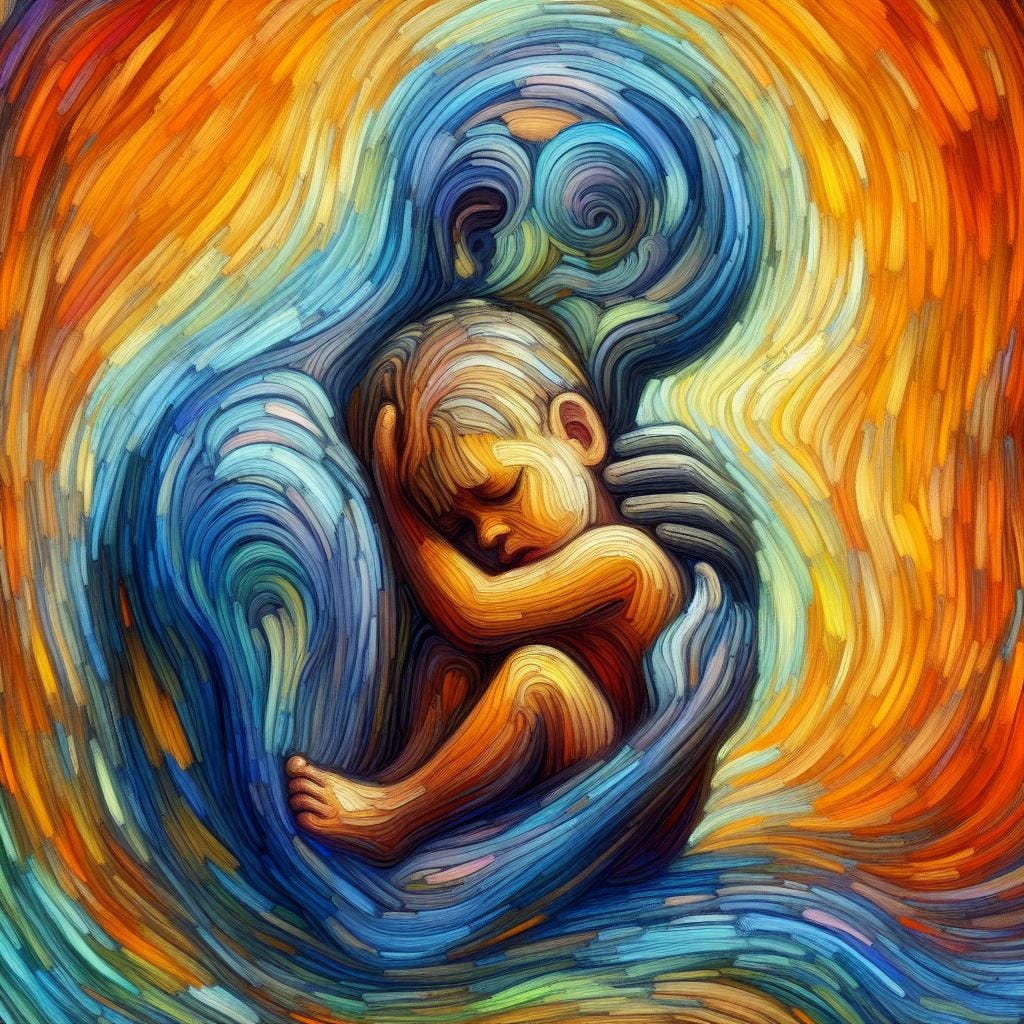Although I find it often unhelpful to generalize and rely on formulas when working with clients, I find myself explaining this concept to nearly everyone I work with.
If there is one possibly universal piece of advice I’d like to share about the path of healing and growth, it’s this.
In many ways, it’s counterintuitive. That’s why this is so important to understand. We need to retrain our mind and body around our feelings and stories, and this is maybe what most therapy and even meditation is about.
Let’s start with an example. One of the more common complexes I encounter is the feeling-belief of not being good enough.
A client may have had an overly critical father who withheld love and care. The father’s intentions may have been good, wanting his child to succeed in a difficult world, pushing his kid to perform at their best, all the while unknowingly instilling a deep feeling and belief of inadequacy.
Carl Jung came up with the idea of a complex, which can be thought of as many experiences that invoke and reinforce the same feeling-belief.
If your complex is about not feeling good enough, then you will have many memories of experiences that reinforced this. Note that I use the term “feeling-belief”, as this complex is both a feeling of not being good enough and also a belief in not being good enough.
Sometimes we talk about it as a feeling, sometimes a belief — but it’s both, and that’s really important to understand.
Because we don’t realize feelings and beliefs are in fact separate (but related) things, when we attempt to overcome a complex we will often attempt to reject the feelings and beliefs together.
The problem here is that when we try to resist feelings, we do this by contracting around them. We tighten up because we don’t want to feel something, but this actually results in more inner conflict, as we best release feelings in the exact opposite way.
When we tighten up around feelings, we are actually making them more stuck. We release feelings not resisting them, but by relaxing and feeling them.
While we want to embrace our feelings, we don’t want to feed or reinforce the story.
I’m sure you’ve experienced this, when you get emotionally triggered and start to spiral into past memories reinforcing this same feeling, only throwing more fuel on the feeling fire.
So we don’t want to feed the feelings, we don’t want to make them any bigger than they need to be, but we do want to feel them as they arise.
When you separate the feelings from the story, you’ll find they are much less scary. But it’s not always easy. The feelings can be so stuck to the story that it can seem impossible to separate the two. This is why we need to rewrite the story.
Rewriting The Story
To rewrite the story around our complex, we want to explore the core story or stories that the feeling evokes.
We can start by thinking of a feeling that gets triggered, and then explore what is the earliest you remember feeling this way, and continue to explore what events or times in life evoked this feeling.
In the example of not feeling good enough, a person may remember specific instances of being criticized by their father, and also other events and people or dynamics that reinforced this feeling-belief.
The good news is you don’t need to process every event that has ever happened tied to this complex. Instead it’s most helpful to try to clarify the core belief here, and then look at the core experiences or dynamics that enforced that belief.
The stories can help to evoke the feeling, but it is not the stories that need to be processed, it’s the feeling that needs to be felt so we can begin to grieve. The healing process is a grieving process.
We want to form a new story that makes sense of the feeling, and actually makes us feel more safe to feel it, but doesn’t reinforce the belief.
In the case of not feeling good enough, a person can reflect back and see that they had unreasonable demands put on them when they were only a child. The question here is can they see the events and dynamics in a way that brings understanding and compassion to their younger self?

Often these feeling-beliefs are so entrenched that people still feel judgment towards their past selves, even if they were young and innocent. In therapy we work to explore the ingrained self-judgments from different perspectives, poking holes in the logic and allowing these beliefs to unravel over time.
It can be helpful to tell the stories that instilled these feeling-beliefs, reflecting from an outside or 3rd person perspective, allowing a person to untangle their self-judgments from what actually happened and create a narrative that is more balanced and self-compassionate.
There is much work that can be done here, and the more ingrained these feeling-beliefs are, the more time it will take to rewrite and believe the new story.
When a person can begin to believe the new story, they will begin to feel more safe to revisit the past events and process the feelings.
The Risk of Retraumatization
When we trigger the feelings we also trigger the associated belief, which can be overwhelming and in turn retraumatizing. This is why it’s very important to unravel the story of self-blame and create a new story before attempting to confront the depth of feelings that need to be processed.
To me, the new narrative is the most essential step as it allows a person to shift from reinforcing the feeling-belief with self-blame to releasing it by grieving. This shift in perspective can feel liberating, but it is only the beginning of the healing process.
It is key to understand and abide by the window of tolerance, being sure that one can stay present with the difficult feelings and not fall into unmanageable levels of distress that overwhelm their nervous system.
There are many techniques for staying in the window of tolerance, with strategies like titration and pendulation being essential, and also a competent therapist who can provide a sense of co-regulation.
Feeling the Feelings
When the story is rewritten and there is respect and understanding for the limitations of a traumatized nervous system, the next task is to embrace the process of grieving.
When feelings are too big to fully confront we dissociate. Therapy is all about creating this safe environment to revisit and process long avoided feelings.
This is not just something we practice in therapy, but it happens all the time socially. We get triggered by someone and we call a friend to tell them about it. Telling the story helps us process the associated feelings, which is why we usually feel better after recounting a challenging experience to an empathetic person.
Meditation can also be very effective in helping us to process difficult feelings. When we meditate, we are learning to simply meet the moment as it is, without trying to change it.
We can bring more attention and clarity to difficult feelings, while putting aside or at least not feeding the associated stories and beliefs. As the feelings become untangled from the stories and beliefs, they feel less threatening, and we learn to relax around them instead of contracting, gently embracing them in a way that allows them to move through us more naturally.
We are not trying to control our feelings, but instead relax and allow them to flow through us unobstructed.
Resisting feelings uses up a lot of energy. Breakdowns happen when our feelings build to the point of tiring out our resistances, flooding us with emotion.
In meditation we are practicing meeting our experience more fully as a default way of being, so feelings don’t build up to the point of breakdown and overwhelm, but instead we learn to stay relaxed or at least welcoming and let feelings spontaneously flow through us.
The more we learn to embrace difficult feelings, the more smoothly they flow through us. Resilience is not being thick skinned when it comes to difficult experiences, but instead learning to relax and embrace difficult feelings so that it deepens our capacity to be with pain and discomfort.
This is what equanimity is all about; learning to embrace discomfort in a way that makes the experience less difficult.
The Real Shift
First we learn to see ourselves and our experience in a less judgmental, more compassionate way.
This makes us more safe to feel our feelings, as they are no longer reinforcing a negative self-view.
This is the training, but the real change happens when we start to meet the world differently.
Our complex has trained us to meet the world in a specific way. If we have the feeling-belief of not being good enough, we will inevitably act in a way that portrays this.
To really believe we are good enough, we need to start acting like it. We need to adopt behaviours that reflect this new identity, even though it may feel difficult and unnatural at first.
When we stand up for ourselves, enforce healthy boundaries, and go after the life we truly want, we are communicating to ourselves that we are in fact good enough. It is this process of action that reflects our new identity, and real change is always a change in identity.
This is usually a challenging process, and can take years to integrate. It requires patience and self-compassion. It will not be smooth, it will not easy, and there aren’t any shortcuts.
But with each small success, there’s a reward. A feeling that we are honouring ourselves, that we are inherently worthy and deserving; we develop a healthy sense of pride and integrity.
When we have these small wins and feel that sense of empowerment that comes with honouring ourselves and standing in our truth, we can begin to love the struggle and more fully embrace the healing process.
And this is the key to growth; a shift from resenting the challenges of life to embracing them.
When we feel the payoff of our hard work, the sense of integrity that comes from honour our truth, the work feels less daunting and more tangibly meaningful.
I want to whole heatedly thank all my paid subscribers! You are making this writing possible.





A well received article as I find myself wrestling with my narratives, again. Thank you for your perspective as well as some nice correlations between modes and methods.
This article and the meditations are very helpful. My issue (well, one of them) is feeling undeserving of love and care. While being able to rationally understand that an embryo, baby, child is not inherently undeserving of love is easy, emotionally understanding this is impossible. Being able to flip the narrative and say that the actions of others were not a result of my shortcomings but theirs has to be a step in the right direction, right? With this, I can then say I did not create the story, I merely live/lived through it and it hurts. This, I no longer have to take responsibility for the story, I get the opportunity to be there for the hurting child and allow her to feel and grieve the same way I would for my own beautiful daughter. Thank you.